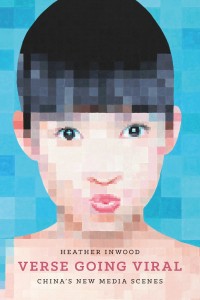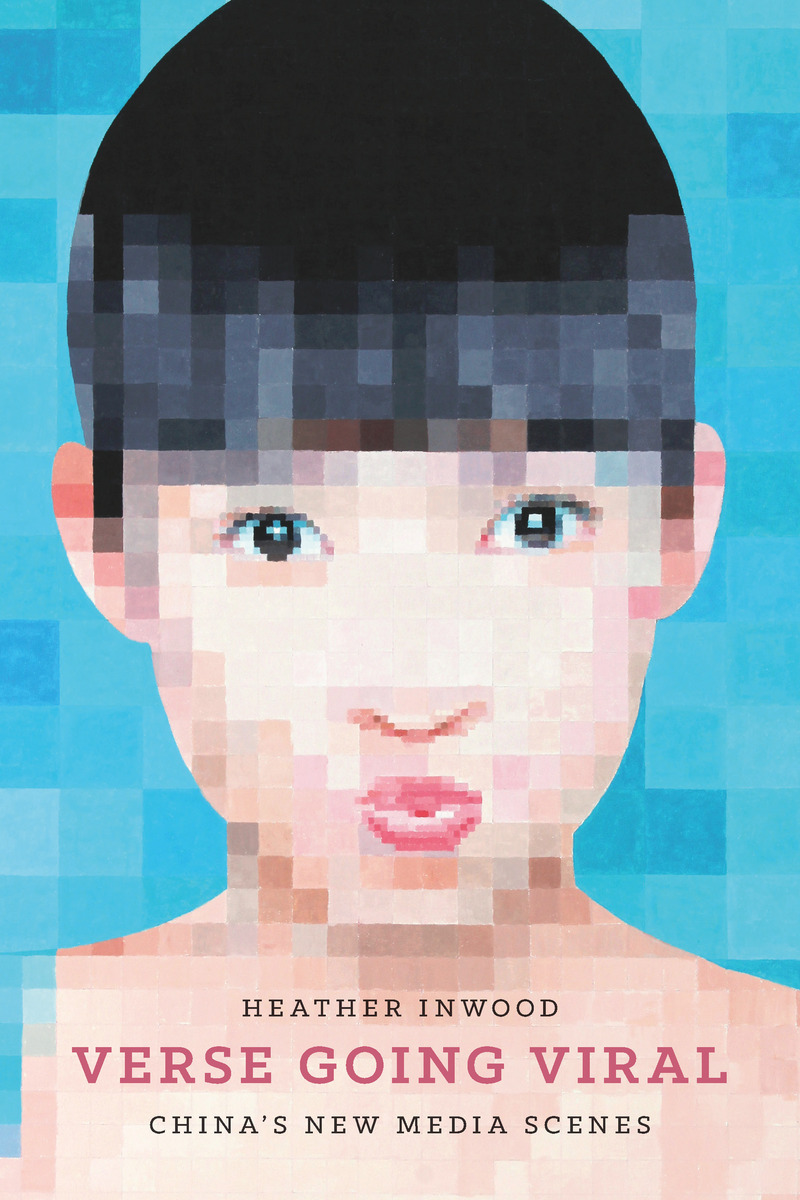Poetry is revered in China, but is it still a living art form? In 2006, Han Han said modern poetry–and poets–are of “zero value.” Reverence for classical poetry begins when children are taught to recite the verses of masters like Du Fu and Li Bai, but what of poetry that is written today? Heather Inwood, lecturer in Chinese cultural studies at the University of Manchester in the UK, explores the production and performance of contemporary Chinese poetry in her first book, Verse Going Viral: China’s New Media Scenes. Dr. Inwood focuses on the “scenes” of poetry production, rather than analysis of the works produced. Those scenes, both virtual and physical, on the printed page and at live performances, are where poets share and critique each other’s work, interacting as “poet-citizens.” Inwood finds that poetry is indeed alive and well in China, not just as the work of isolated individuals, but as the fruit of a shared cultural practice.
Dr. Inwood and I talked about Chinese poetry scenes and the blurring of online and offline worlds via email:
China Digital Times: What first drew you to study Chinese poetry scenes?
Heather Inwood: When I was an MA student at Peking University in the early 2000s I got to know quite a few younger generation poets in Beijing and became interested in the discussions that were going on around contemporary Chinese poetry at the time. It was an exciting period to be involved in poetry scenes: Writers born in the 1970s and early 1980s were being described as embodying a new tidal wave of contemporary poetry, at the same time as poets of all ages were moving online and exploring different ways of writing and interacting on poetry forums and blogs. I became fascinated by the discourses surrounding contemporary poetry both within these tight-knit communities of poets, who were approaching poetry with a kind of fervor that many thought hadn’t been seen in China since the 1980s, and among the general Chinese public, who seemed largely oblivious to the fact that poetry was even being written anymore. It was in part this disconnect that made me want to explore the notion of “scenes” further—this English term, plus its various Chinese equivalents, seemed to have a lot to answer for.
CDT: You briefly mention your fieldwork observing live scenes. Would you say that you were a participant observer? How involved did you become in the scenes themselves, as both an audience member and even an active participant?
Inwood: I would certainly describe the fieldwork I did as participant observation. One of the great things about researching contemporary cultural scenes is that there are ample opportunities to be on the scene of culture as it happens and to experience the cultural energy firsthand, whether online or “in the flesh.”
There were some periods of fieldwork when I seemed to be invited to poetry events almost every week across the length and breadth of mainland China. The most involved I became was when asked to share my thoughts on literary debates or recite poems at poetry events; in general I tried to contribute in a way that showed willingness and didn’t offend my hosts, but that did not overly influence the course of the events I was attending. For the most part, poets seemed bemused that I was showing such interest in what they were doing and saying—China’s contemporary poetry world tends not to get as much international attention as other areas of culture such as film or art.
CDT: You toss out that your fieldwork occasionally involved “all-expenses-paid excursions to foot massage parlors.” How did your relationship to poets evolve through your research?
Inwood: The foot massage parlor trip was a memorable occasion—especially as I was the only woman in the room receiving and not giving a massage—but there were plenty of occasions that forced me to negotiate tricky terrain in my relationship with the poets I was researching, including bouts of heavy drinking, proper fist-fights (which I kept my distance from!), and extremely long, formal roundtable meetings with local government officials. I got to know some poets quite well, and my research benefited from maintaining long-term contact with my informants.
Some of the most challenging interactions I had with the poets I was researching took place online. I reached out to one (rather controversial) poetry group via their online poetry forum and subsequently underwent a kind of unofficial initiation process whereby I attempted to secure the trust of group members by demonstrating my familiarity with their poetics and making clear I was taking their poetry as seriously as they felt it deserved to be. After a few months I became more accepted into their poetry community and would sometimes find posts on the forum directed at me, asking me to respond to a question or translate their poems into English. I did worry about what it might mean for me to be known by name within the poetry communities I was researching, but ultimately it was these kinds of interactions that gave me an “inside” perspective on an area of culture that often gets unfairly written off as hopelessly marginalized or irrelevant to contemporary Chinese life.
 CDT: Could you respond to last year’s Lu Xun prize and the public backlash? Based on recoil from previous prizes which you discuss in your book, it seems like nothing new.
CDT: Could you respond to last year’s Lu Xun prize and the public backlash? Based on recoil from previous prizes which you discuss in your book, it seems like nothing new.
Inwood: One of the poetry prizes in this year’s Lu Xun Prize for Literature was awarded to the Sichuan University professor Zhou Xiaotian for his classical-style poetry. The backlash to Zhou’s award was an echo of the examples of “verse going viral” that I explore in the last chapter of my book. Like the much-berated 2010 winner and Wuhan Party Secretary Che Yan’gao whose “baby lamb form” poems went viral that year, Zhou is an authority figure, which in itself makes him a target for ridicule among China’s highly irreverent, mostly quite young Internet users. Whereas Che wrote free verse about female celebrities from Wuhan, Zhou writes regulated verse using modern-day rhyme schemes about topics such as the TV talent show Super Girl, foot-washing, and Leslie Cheung.
Every time living Chinese poets receive official accolades, the default response of the Chinese public is to ridicule the authors concerned and let out a collective sigh about the state of poetry writing today. In my book I explain this in relation to the cultural memory that surrounds the genre of poetry in China: most Chinese citizens are taught about the great achievements of classical poetry through their home- and school-based educations, with a few Republican-era and Misty poems thrown in for good measure, and as a result have a strong sense of ownership over the cultural memory of poetry. China is a nation that prides itself on its classical poetic tradition, and thus when people today are confronted with either modern or classical-style poems that don’t quite look or sound like those they had to memorize in school, they don’t really know how to react other than with bemusement, shock, and horror.
Part of it is also a knee-jerk reaction to suspicions of corruption between mainstream culture and politics in contemporary China. The assumption is that if you are winning high-profile awards and happen to also be a government official or university professor, the chances are you got your accolades via some underhand means. Whether this is true or not, the reactions from Internet users reflect the general culture of irreverence and suspicion of authority that characterizes much online discourse in China.
CDT: Your book addresses the question of whether Chinese poetry is a “literature in crisis” in a “poetry country.” Other nations also pride themselves on their poetic traditions but scorn contemporary poetry. Do you see any parallels between the struggles of poetry communities in China and in other countries, such as the UK?
Inwood: The “death of poetry” has been a recurring theme for many years in most parts of the world; China is by no means alone in worrying about the state of the nation of poetry. In just about any country where popular culture and digital media have altered reading habits and affected the market for books you will find poets worrying about their shrinking audience and critics lamenting poetry’s loss of relevance to contemporary society. This is certainly the case in the UK, the US, Canada, and many other countries. Equally, in every instance this turns out to be simply not true: people will always write poetry, regardless of who is reading or listening or what other media temptations may exist, and as long as poetry is being written it will be continue to be relevant to lives around the world.
What makes China such an interesting case study is that modern poetry was a part of mainstream culture as recently as the 1980s, when poets like Gu Cheng and Shu Ting were seen as national celebrities–at least among a significant portion of China’s educated population. Up until just over 100 years ago, the importance of poetry was institutionalized through its inclusion in the civil service examinations, meaning that poetry was not just a highly respected art form and way of life, but also a direct channel to employment in the highest levels of the imperial bureaucracy.
This enduring association between poetry and elite society is another reason why poetry’s loss of readership in the last couple of decades has been felt so keenly in China. It also explains the ongoing efforts of writers and critics to expand the social reach of poetry, for example by advocating the poetry of migrant workers (打工诗歌 dagong shige) or championing “popular” (民间 minjian) poetry over “intellectual writing” (知识分子写作 zhishi fenzi xiezuo), as we saw in the late 1990s and early 2000s.
CDT: What implications do you think your research has for online culture more generally in China?
Inwood: The case of modern poetry is emblematic in many ways of the cultural changes—and continuities—that have been enabled by the growth of the Internet. Poets walk the same tightrope as most cultural producers in China, using their art as a means of self-expression and a tool for social commentary at the same time as they attempt to survive in the “grey” spaces between government approval and censorship and avant-garde and popular tastes. The questions that they confront in their writings are often timeless in nature: how can I expand the boundaries of poetic art while convincing others that what I write is still poetry? How much do I care about the size of my audience—is it enough if a few of my best friends like what I do, or should I be attempting to reach out to a larger readership?
The supposedly more democratic mode of cultural participation that the Internet makes possible has been a mixed bag for China’s poets. In the 1990s and early 2000s there was a lot of excited chatter about the Internet’s revolutionary implications for the development of digital and multimedia poetry writing, accompanied by an explosion in the number of active poetry groups in China. Nowadays, however, there still seems to be a general consensus that a poem is a fixed, linear text that can be read aloud or recreated in printed form, and the poets who are most well-known in China and elsewhere are still those who have the cultural and economic capital required for regular appearances in print publications and face-to-face events. As with other areas of culture, achieving name recognition online is by itself insufficient evidence of success or celebrity in China today. Your online actions have to be backed up offline, whether through selling books, making films, attending ritzy events, cooperating with big business, appearing in the news or being invited to international cultural festivals.
While a conservative approach is often wise when discussing the cultural changes brought about by the Internet, there are nonetheless subtle shifts underway that we probably won’t fully appreciate for a number of years to come. Scholars of oral culture like the late John Miles Foley (author of Oral Tradition and the Internet: Pathways of the Mind) have pointed out that the patterns of cultural transmission and consumption that we can observe in action on the Internet have much in common with the ways that culture circulates in the oral tradition: contingently, in the moment, and via networks and pathways that only exist once users put them into practice. This implies that much of what we experience as “new” or revolutionary online is in fact a continuity of age-old patterns of cultural meaning-making that existed long before the invention of computers and the Internet, and even long before the age of print. It also seems safe to say that the division we currently imagine between “online” and “offline” realities is going to disappear as the Internet becomes ever more integrated into our physical world.
Increasingly, people are finding cultural value in the briefest moments of connection with others, as when sharing an image or video via social media, and less in the creation or consumption of stable “texts” that are designed to stand the test of time—or to stand up to serious critical scrutiny. As a brief, verbal, and highly editable (and imitable) form of art, poetry might be experiencing these changes more keenly than most, but all areas of culture around the world are ultimately confronting similar challenges and opportunities. As greater numbers of people find themselves able to produce, transmit, and consume culture using digital media technologies, what we describe as a “work of art” or “cultural text” is inevitably going to have to change. I for one see this as a good thing: snobbishness is of little use when it comes to understanding the myriad ways that people use visual, verbal, and aural modes of expression to give cultural meaning to their lives.








